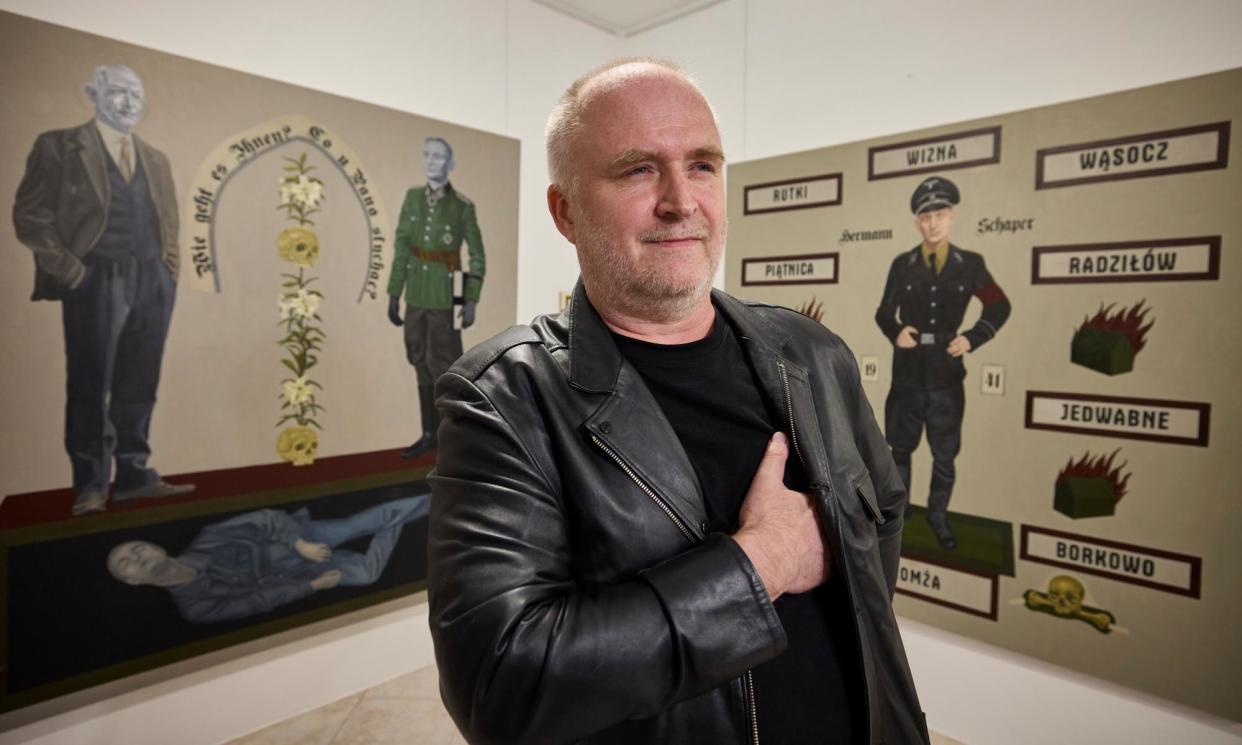Political tensions simmer behind Poland’s Venice Biennale entry

In a world beset by culture wars – not to mention full-scale wars – it is no surprise that political tensions seethe beneath the surface of the Venice Biennale, a global art event.
Take Poland. Its national pavilion this year hosts work by a collective, Open Group, from neighbouring Ukraine. But the artists were last-minute replacements for a painter, Ignacy Czwartos, who was selected to represent his country under Poland’s previous, rightwing government – and then deselected in December by the incoming centrist coalition.
Not daunted, Czwartos is showing his work under the banner “Polonia Uncensored” in the Venetian home of a sympathetic Polish-born retired doctor. The building happens to face directly on to the back wall of Poland’s grand national pavilion at the edge of the city’s Giardini, or public gardens.
A painting by Czwartos that has sparked particular comment depicts the former German chancellor Angela Merkel and the Russian president, Vladimir Putin, flanking a shape that recalls a swastika. The words Nord Stream 2 – as in the gas pipeline – are rendered in Gothic script below. Other works refer to violent episodes from the second world war.
“Anyone can do an exhibition in Venice if he has the money,” said Marta Czyż, the curator of Open Group’s exhibition. Czwartos’s work, she added, “has totally different values from most Polish citizens. His paintings communicate the idea that everyone is our enemy; they promote Polish nationalism.”
Open Group’s exhibition is titled Repeat After Me. In a pair of films, Ukrainian displaced civilians use their voices to imitate the sounds of war – creating harrowingly detailed renditions of air raid sirens, tanks, aerial bombardment and mortar shelling. The work is set up as a karaoke for visitors to imitate.
The first part of the work was filmed in the summer of 2022 “when people were full of hope that everything would finish soon”, said Open Group member Anton Varda. A second part was filmed this year, with refugees who had fled farther afield to western Europe and the US, taking the traumatic aural memories with them. “And so this war geography spreads,” said Varda.
Repeat After Me was inspired, he added, by a public information leaflet that was distributed in Ukraine shortly before the full-scale invasion of their country by Russia in 2022 – “25 pages of different scenarios and different algorithms of things you should do” in the case of an attack. “And the only definitive way of defining different weapons was by their sound. Good luck with that!”
The sounds of artillery, air defence and cruise missiles may have been unfamiliar to many in central and western Ukraine at the start of 2022, but they are all too well-known now. At the same time, everyday sounds have taken on a new, often terrifying significance when they recall the sounds of war.
Fellow Open Group member Pavlo Kovach, who has been in the armed forces since July and is working with the families of killed soldiers, recalled how, on his first night in barracks, he started whistling. His new comrades told him: “We can tell you’ve never been to the frontline. That whistling sounds just like a mortar.”
The openings of the rival exhibitions presented a heavy contrast. Hundreds turned out for the official Polish pavilion opening, which was inaugurated by the culture minister, Bartłomiej Sienkiewicz.
The pavilion’s curator, Czyż, thanked the minister for his “swift and brave decision” to invite Open Group to take on the exhibition. “Art reminds us of what are the most important things in our lives: solidarity, compassion and empathy,” said Sienkiewicz in his speech.
Czwartos’s opening was a low-key affair, with a handful of guests including representatives of the Polish foundation that had funded the show. A censorship-themed issue of an art magazine, Obieg, was distributed, containing an article charting the events leading up to the new culture minister’s decision, citing previous Guardian reporting on the affair as a factor.
Czwartos said he had been the focus of slurs and claims he is a fascist. “I am not,” he said. “I am an anti-fascist: I am telling the truth about history. The fact is that Poland was a victim of both Nazi Germany and Soviet Russia in the second world war.” The painting of Merkel and Putin, he said, referenced the Molotov-Ribbentrop pact, “which resulted in a horrible disaster for Europe. History repeats itself.”
Open Group member Anton Varga was visibly moved during the opening ceremony for the official pavilion. Thanking the assembled guests for their solidarity, he said: “Hopefully next Biennale we will meet again in a more peaceful world.”
Asked by the Guardian why he had taken the decision to replace Czwartos with the Open Group, Sienkiewicz, gestured towards the interior of the Polish pavilion. “Have you seen the emotions in it?” he said. “They serve as the explanation for the decision.”

 Yahoo News
Yahoo News 
